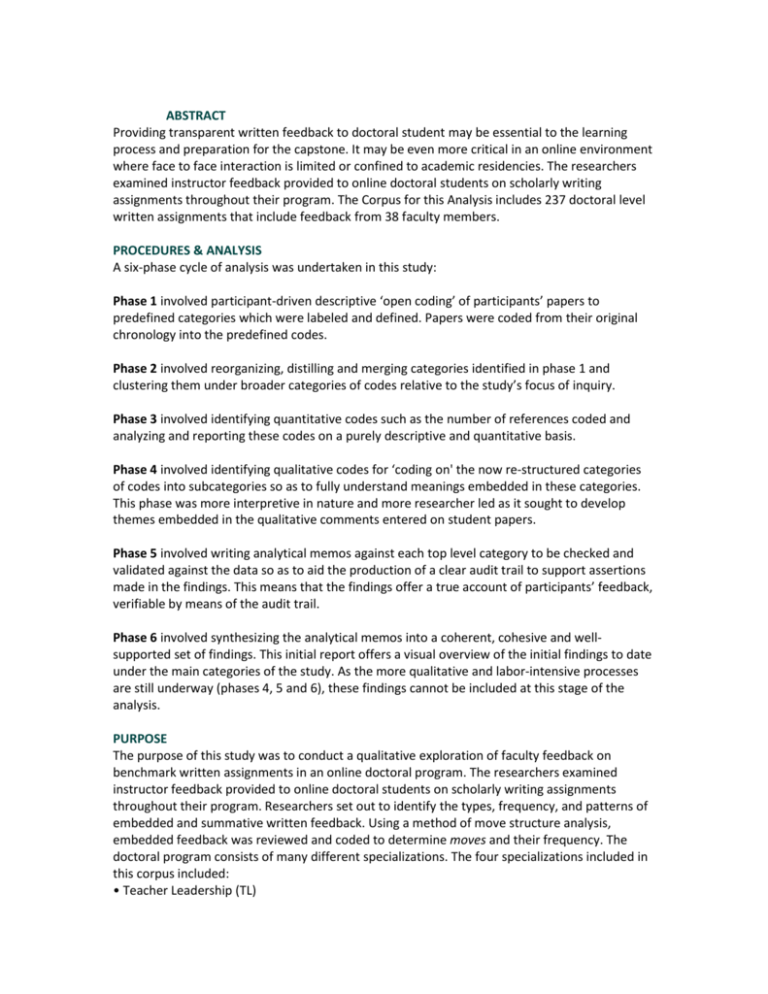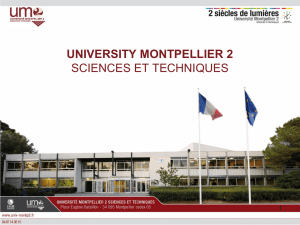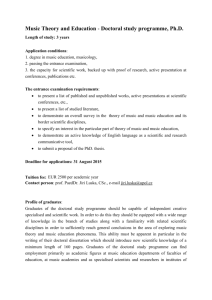The Genre of Instructor Feedback in Doctoral Programs: A Corpus
advertisement

The Genre of Instructor Feedback in Doctoral Programs: A Corpus Linguistic Analysis Kelley Jo ABSTRACT Providing transparent written feedback to doctoral student may be essential to the learning process and preparation for the capstone. It may be even more critical in an online environment where face to face interaction is limited or confined to academic residencies. The researchers examined instructor feedback provided to online doctoral students on scholarly writing assignments throughout their program. The Corpus for this Analysis includes 237 doctoral level written assignments that include feedback from 38 faculty members. PROCEDURES & ANALYSIS A six-phase cycle of analysis was undertaken in this study: Phase 1 involved participant-driven descriptive ‘open coding’ of participants’ papers to predefined categories which were labeled and defined. Papers were coded from their original chronology into the predefined codes. Phase 2 involved reorganizing, distilling and merging categories identified in phase 1 and clustering them under broader categories of codes relative to the study’s focus of inquiry. Phase 3 involved identifying quantitative codes such as the number of references coded and analyzing and reporting these codes on a purely descriptive and quantitative basis. Phase 4 involved identifying qualitative codes for ‘coding on' the now re-structured categories of codes into subcategories so as to fully understand meanings embedded in these categories. This phase was more interpretive in nature and more researcher led as it sought to develop themes embedded in the qualitative comments entered on student papers. Phase 5 involved writing analytical memos against each top level category to be checked and validated against the data so as to aid the production of a clear audit trail to support assertions made in the findings. This means that the findings offer a true account of participants’ feedback, verifiable by means of the audit trail. Phase 6 involved synthesizing the analytical memos into a coherent, cohesive and wellsupported set of findings. This initial report offers a visual overview of the initial findings to date under the main categories of the study. As the more qualitative and labor-intensive processes are still underway (phases 4, 5 and 6), these findings cannot be included at this stage of the analysis. PURPOSE The purpose of this study was to conduct a qualitative exploration of faculty feedback on benchmark written assignments in an online doctoral program. The researchers examined instructor feedback provided to online doctoral students on scholarly writing assignments throughout their program. Researchers set out to identify the types, frequency, and patterns of embedded and summative written feedback. Using a method of move structure analysis, embedded feedback was reviewed and coded to determine moves and their frequency. The doctoral program consists of many different specializations. The four specializations included in this corpus included: • Teacher Leadership (TL) • Administrative Leadership (AL) • Curriculum, Instruction, and Assessment (CIA) • Special Education (SPED). PROBLEM Students at the doctoral level do not always exhibit strong scholarly writing skills. This can delay their program completion when writing a doctoral study. Instructor feedback may play a determining factor to student success. Hence, providing students with clear and consistent feedback on scholarly written course work may enhance the writing abilities of doctoral candidates better preparing them for their final capstone. This investigation was designed to look closely at the feedback provided by instructors so that we might gain insight on how to enhance student writing ability. RELEVANT LITERATURE Instructional faculty are in the position to provide a transfer of knowledge and skills, while supporting students at their developmental ability level. This is consistent with Vygotsky’s concept of ‘scaffolding’ or providing support in a way that helps students become independent learners. Appropriate support is necessary for students to progress through the milestones in order to complete the doctoral degree. According to Knowles, Holton, and Swanson (2005), Adults need to know why they need to learn something before undertaking to learn it. Tough (1979) found that when adults undertake to learn something on their own, they will invest considerable energy in probing into the benefits they will gain from learning it and the negative consequences of not learning it. Consequently, one of the new aphorisms in adult education is that the first task of the facilitator of learning is to help the learners become aware of the “need to know.” At the very least, facilitators can make an intellectual case for the value of the learning in improving the effectiveness of the learners’ performance or the quality of their lives (p. 64). Qualitative components were addressed based on the constant comparative method according to Maykut and Morehouse (1994) who draw on the work of Glaser and Strauss (1967) and Lincoln and Guba (1985) in their development of this methodological framework. RESEARCH QUESTIONS This study sought to answer the following questions: 1. What types of embedded feedback are found in doctoral level written assignments? 2. What is the frequency of each type of embedded feedback? 3. What moves emerge from this embedded feedback? 4. What is the frequency of summative feedback? 5. What methods outside of written feedback are utilized, if any? SOCIAL CHANGE IMPLICATIONS Students of varying levels of written communication skills enroll in our doctoral programs. During the doctoral study, when the writing is the most intense and the standards are the highest, students are too far along to instill good academic writing habits. It is important that writing intervention occur early in their program. Successful doctoral students from Walden are not only able to change their own lives and that of their family, but they take these skills out into the world to become people who are impacting social change in the lives of others, but they take these skills out into the world to become people who are impacting social change in the lives of others. LIMITATIONS While this study crosses many specializations and includes more than one specialization area, it is being conducted in one doctoral program at one university only. Rubrics are sometimes included as feedback for students. We did not analyze these in detail, but included them as summative feedback. CONCLUSIONS Researchers are still in the process of analysis, but can make the following conclusions based on frequencies: Most feedback is provided in the margin (53%), through the use of highlighting (25%) or through the use of track changes (19%). Little feedback in given in the form of summative comments (3%). 76% of all feedback was given in the form of short sentences (defined as a single sentence), where 4% of the feedback included more than three sentences. Long papers received less feedback than short ones. 35% of all feedback focused on formatting (14%) and conventions (16%), while 5% focused on writing organization and 12% focused on content. FINDINGS Some Frequency Findings Each of the specializations includes courses with major assessments that are considered benchmark assignments that students must pass in order to continue in their program. These major assessments were used for this corpus. 2012 Faculty Research Initiative Grant from Walden University Theme Development Once frequencies were calculated, researchers considered the more qualitative aspects of the study. Specifically, the nature of feedback embedded in the student papers was placed under scrutiny. Below are the initial thematic codes that have been developed. The main report will show the secondary coding, now underway, of these initial themes. The chart below shows the qualitative themes to date and their frequencies:



